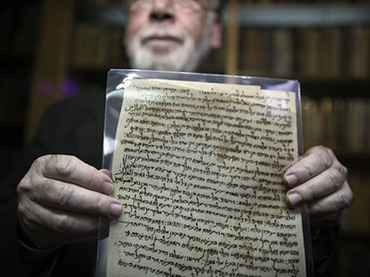
The rare documents were discovered by villagers near the Iran-Uzbekistan border in a cave believed to be the home of a family of foxes. The manuscripts include religious writings, as well as letters and civil contracts written in Hebrew, Aramaic, Arabic and Persian, and in a variety of alphabets.
The cache, sometimes known as the Afghan Genizah, has "rocked the world of scholars" who study ancient manuscripts, as well as the dealers who buy and sell them, Haaretz reported.
The key manuscript acquired by the library is a page from Saadia Gaon's commentary on the Bible. The document is a 10th-century commentary on Isaiah 34, written in Judeo-Arabic.

Although the exact number of manuscripts in the Afghan Genizah is not known, it rumored to be in the hundreds - tiny in comparison to the 200,000 of the Cairo cache, which is spread among dealers in Switzerland, England and other nations, Haaretz said.
An antiquities dealer in Jerusalem who obtained a small part of the collection offered it for sale to the National Library. The negotiations reportedly continued for over a year. The library refused to say how much it paid for the collection.
"The area where the material was found, which today is considered remote, was an important cultural, political and economic center in the Medieval era," said the library's academic director, Prof. Haggai Ben-Shammai of Hebrew University.

"Along the way, Jewish trading stations were established for Jewish traders, and over time they became Jewish communities. There is documentary evidence of Jews from Baghdad and Aleppo, of Karaite Jews and Jews from Persia, all of whom settled in the same region," Haaretz quoted Ben-Shammai as saying.
Scholars at the library hope the ancient pages will shed light on the Jews who lived in this region.
"We've had many historical sources on Jewish settlements in that area. This is the first time that we have a large collection of manuscripts that represents the culture of the Jews who lived there. Until today we had nothing about this," Ben-Shammai explained.
The pages will be scanned and uploaded to the National Library's website in the near future.



Reader Comments
to our Newsletter